#osdd switch
Text
I've been super aware of switches and who's fronting lately. I can recognize who's voice is whos, various memories and feelings and body language. I can even almost pinpoint how people talk based on where in my throat or chest they're using my bodys voice
Its taken me probably about 2 years to get to this point and its taken documentation, constant asking myself questions and so much patience
These questions include
Who am i
What names do i resonate with
What do i look like inside
Where am i from
What do i remember
What is familiar about where im at, and have i fronted here yet(often asked at work or in my current home)
How do i know the people around me
Do i particularly like or dislike something
What are my base emotions (alters cant be boiled down to singular emotions necessarily but some tend to experience one more than others and it can help section them off)
How old are they
How many are there
Can they speak or are they semi-verbal, mute, or do they talk in ways that arent words(some use music or animal noises or just communicate telepathically)
There are loads of other questions and its not like i go through the entire list every time but things like this have helped me figure out a lot more about my system. It's about who affects what, what triggers who, and how everyone navigates the world and why.
This may not work for everyone but im hoping this resource may help someone
#osdd#actually osdd#system babbles#switches#osdd switch#osdd split#new alter#new headmate#did split#system split#system feels#system resources#reference#system questions#identity confusion
66 notes
·
View notes
Text

it was difficult to fit every type of switch here, so i would be happy to hear in replies what switching is like for you!
- amaranth.
#amaranth🫁.txt#• [system polls] •#(#sys polls#poll#polls#system poll#system stuff#endos dni#tulpas dni#system#traumagenic system#did system#did#osdd1#osdd system#did switch#system switch#)
114 notes
·
View notes
Text
This is your daily reminder that you don’t need to switch regularly to be a system.
We’re a diagnosed DID system. Usually one of the hosts will take over completely for two or three days and because of our low communication (especially between frequent fronters) there will be radio silence.
When we first joined the system community, there was a lot of talk about switching regularly and losing days at a time and yes that does happen to some people and that is valid.
It’s also valid to be like us. We have one host front for a few days and occasionally other people will drop by. Our other host will get us dressed on the rare occasion we have to leave the house (about once an month) and will take over for a day if the first host needs a break. That works for us. At first, we switched maybe once a week. Now we switch two to four times a week.
Not switching often is valid. I don’t just mean a couple of days either. Not switching for weeks is valid. You are valid no matter how your system fronting works and how you adapt to that.
Take care of yourselves and accept yourselves for you. You don’t need to be like any other system.
67 notes
·
View notes
Text
am I dissociating or is it just really FUCKING boring
#love drivers ed#i cant tell if we're switching or if its just not interesting enough to remember#actually did#system memes#did osdd#did system#osddid#sysblr#did memes#osdd memes
324 notes
·
View notes
Text

*remembers simply plural exists*
*hasn't logged a switch in a few days*
*opens simply plural*
*switches while it loads*
*fronter is already fronting*
#system memes#actually did#did osdd#did community#dissociative system#sysblr#actually dissociative#traumagenic osdd#did memes#actually traumagenic#traumagenic system#did alter#dissociative alters#alters#switching#simply plural
370 notes
·
View notes
Text
plural culture is minding your own business when you just suddenly type and speak differently, having no idea who the fuck is fronting anymore
#no idea who i am actually#it just be like that sometimes i guess#did system#osdd system#plural system#dazeddreams posts#like seriously?? where are the switch cues??? we usually get more dissociated unless it got triggered out fberjskfhk#anyways
147 notes
·
View notes
Text
that kind of "seamless switching" where you don't immediately notice the switch is a really weird experience because you'll just go about whatever you were doing and then realise oh i'm fronting now damn how did that happen
#especially in situations where you wasn't supposed to front#like oh fuck oh shit let me back inside#did things#system things#cdd things#osdd things#pdid things#cdd switching#actuallydid#actually did#actually osdd#actuallyosdd#actuallypdid#actually pdid#actuallycdd#actually cdd#ours#levi here
319 notes
·
View notes
Text
Comic 5
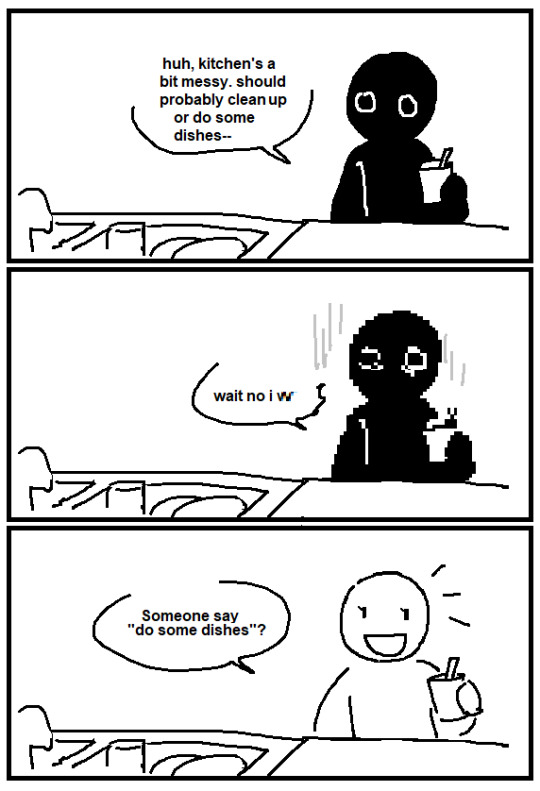
this has happened Multiple times. did not think someone's positive fronting trigger would be Doing Dishes
#comic#osdd system#dissociative#plural#sorry i very much enjoy portraying switching/dissociating as Bad Ms Paint Resizing
52 notes
·
View notes
Text
Switching Tips and Info
Hello! We’ve often said here that for our system, switching is involuntary and happens automatically or with the help of our gatekeeper. However, we often get asked here about switching, how it works, how to practice switching, and how to switch for the very first time. In general, we’re probably unequipped to confidently answer these questions. But we’ve decided to put together this post with information we’ve picked up from therapy, research, and learning from other systems. We hope this can help you and your system learn to switch more effortlessly!
Disclaimer: We are not an expert or clinician by any stretch of the word! We are one DID system sharing our experience and information we’ve picked up during our time in treatment and system spaces. This post comes from the perspective of a system with DID, though much of this advice could be potentially useful for all sorts of systems!
What is switching?
Switching is a common occurrence in systems when one headmate swaps places with another in order to perceive and interact with the world. Systems of all sorts can switch, not just those with dissociative disorders like DID or OSDD! Switching can look incredibly different from system to system, and may vary based on a wide variety of factors such as:
System origin
Previous history with switching
Degree of dissociative barriers
Comfort levels with fronting and switching for each headmate
The presence of a system manager or gatekeeper
Safety of the system overall
And more!
Do all systems switch?
No, not every system wants to switch or is capable of switching! Many systems exist with one primary fronter and many headmates who either cofront, are coconscious, or never front to experience the outside world at all. Switching is not a requirement to be a system, and it’s not even a requirement to have a dissociative disorder.
Many systems may find that headmates have switched before without noticing it! Before a system’s “syscovery,” headmates may lose time, experience identity shifts, or interact with other system members without ever realizing that they’re plural. In fact, an overwhelming majority of systems with disorders like DID and OSDD are covert, meaning their switches and other symptoms often go unnoticed by other people or the systems themselves!
How can I switch with my headmates?
We don’t have any surefire way to guarantee switching, as every system is unique and no two systems function in exactly the same way! However, here are some ideas for you and your headmates to try in order to help a switch occur.
1. Open communication
Communicate with as many headmates as you can on a regular basis. Keep an open dialogue, and talk to your headmates about fronting, what that might look like for them, and any worries they have about potentially fronting in the future. Try to address each headmate’s fears and concerns to the best of your ability before expecting them to front. Imagine together what it might look like for other headmates to front. Try to understand what happens to headmates in your system who aren’t fronting: do they enter your system’s headspace/inner world? Do they stop fully existing or enter a sort of stasis? Are they still able to perceive the outside world at all? Having a stable, steady line of communication and an understanding of how your system works can help make it easier to allow other headmates to front when the time comes!
2. Seek out a gatekeeper or system manager
Many, but not all, systems have members whose role is specifically to manage who fronts and control switches. Our own system has a gatekeeper who handles the majority of our switches! If you haven’t already, try to learn whether or not your system already has an established gatekeeper. If you do, establishing a connection with that headmate and communicating with them will be essential for switching in the future.
If your system doesn’t have a gatekeeper/manager, that’s fine! A headmate with this role is not required for system to experience switches. For those who do have them, however, cooperating with managers and gatekeepers can help make switching a smoother, more painless process!
3. Ensure safety
Don’t attempt to switch if your system is not 100% safe, and only try to switch after all headmates involved feel comfortable and secure. NEVER try to force a headmate to switch who doesn’t want to. Respect each other’s boundaries and rights to personal autonomy.
When you’re ready to try and purposefully switch, do so in a safe, comfortable, secluded environment. Try to limit distractions and opportunities for interruptions. Check in with headmates that you have access to, and ensure that everyone feels safe and comfortable before attempting to switch.
For minors, traumagenic systems, and those who currently live with abusers or those who have harmed them: it may be for the best to not attempt to switch until you’re in a situation where you are distanced from those who have caused you harm (be them parents, friends, loved ones, or anyone else). Unfortunately for many systems, this may mean waiting until you have moved out of your family’s home in order to put some space between you and your system’s abusers.
Trying to switch when you’re not 100% sure of your system’s safety could absolutely cause more harm than good! The safety and well-being of your system is more important than providing headmates with opportunities to purposefully switch. There will be plenty of time in your future to learn more about your system and attempt to manage switches! Until then, it’s probably best to allow your system to function in ways that ensure your safety and the safety of your headmates.
4. Use positive triggers
Positive triggers are external stimuli that can help bring certain headmates closer to the front by reminding the system about that headmate and what they enjoy. Having a wide range of positive triggers at your disposal can help make it easier to get a headmate to switch with you! Here are some examples of what positive triggers can look like:
Music for each headmate, including playlists, albums, artists, and songs
Stimboards, moodboards, inspiration boards, and other collections of images that speak out to each headmate
Cooking, preparing, or eating a food, snack, or beverage that a particular headmate enjoys
Engaging with hobbies, media, and activities that a particular headmate is known to like
And more! Get creative with your system and brainstorm different positive triggers you can incorporate into your lives in order to help facilitate switches in the future!
5. Manage expectations
Unfortunately, not all systems are able to switch. Some hosts and other frontstuck headmates may never be able to fully leave the front. Cofronting with another headmate and allowing them to make decisions and treat the body as their own can be a great way to allow other system members to front, even if it’s not a full-fledged “switch.” Switching can look incredibly different for different systems, and even for different headmates in the same system! So don’t be too discouraged if you or your frontstuck members aren’t able to switch out fully - cofronting and being coconscious are both valid ways for other headmates to experience the world.
Where can I learn more about switching?
There’s lots of information out there to help all kinds of systems start learning about or managing switches! Here are some links to websites where you can learn more.
Note: some sites which are geared towards created, spontaneous, or endogenic systems may suggest purposeful dissociation as a way to trigger a switch. While this may be useful for some systems, adding more dissociation to the lives of those already struggling with dissociative disorders is a very bad idea and should be avoided! So if you are diagnosed with a dissociative disorder (DID, OSDD, DPDR, etc.), suspect you may have a dissociative disorder, or suspect your system is trauma-formed, it may be best to avoid following advice from sites aimed towards paromacers, those with thoughtforms, and nontraumagenic systems. For everyone’s convenience, we have starred (*) links to guides which involve purposeful dissociation so systems who already have trouble with dissociation can avoid them! If you’re not sure whether or not your system has dissociation issues, it’s best to PLAY IT SAFE and avoid these kinds of guides. Please use critical thinking and your own discretion when reading about switching online!
Terminology note: some of these sites use “tulpa” language, which is known to be racist and culturally appropriative. Please keep this in mind when browsing these sites. In our personal life, we use “paro/paromancy” language instead to avoid causing further harm to marginalized groups.
Intentional Switching (DID) from DIS-SOS
Switching and Passive Influence from DID-Research.org
*Fuliam’s Guide on how to switch from Tulpa.info*
*Malfael’s Guide to Switching from Tulpanomicon*
Our own resource post for questioning systems has lots of links to resources on dissociative disorders and other forms of plurality, many of which may have sections or advice on switching!
Questions? Comments? Something we missed?
We could write whole books on the many different aspects of switching, and how switches can vary from system to system and headmate to headmate. We’re sorry if we’ve left something out here that you or your system thinks is important! This post didn’t touch on passive influence, rapid switching, physical symptoms of switching, and many other switching-related topics. This is just a general overview with some advice on switching intentionally and voluntarily!
If you have any further questions, feel free to comment on this post or send us an ask and we’d be happy to answer to the best of our ability! We may not have all the answers, but we’re happy to share what we know. If you made it this far, thanks so much for reading! Stay well, and have a great day!

#multiplicity#plurality#pluralgang#actuallyplural#long post#dissociative identity disorder#other specified dissociative disorder#partial did#osdd#did#p did#switching#trauma mention#abuse mention
87 notes
·
View notes
Text
Has anyone ever switched in the middle of typing something and just go— "Wait that's not me. Who wrote this??"
306 notes
·
View notes
Text
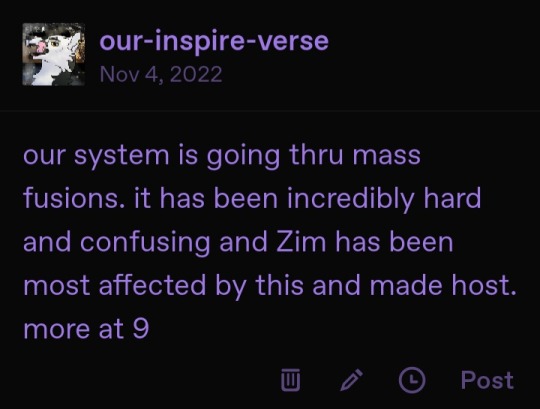
*looks at calendar* damn. That was a little over a month after he became front stuck and it was right before. The Trip.
Anyway. Thought it would be silly to just post it since it would erase the date.
Zim is still the main of our 3 hosts, and fronts most often to this day. Funny how things change.
The system basically got cut in half within almost 1 day, and then slimmed even more after that.
#system babbles#innerworld visuals#oh yeah headspace fully collapses in a big apocalyptic event it was very dramatic but things are good now#actually osdd#osdd#fronter#host#host change#system host#switches#osdd switch#headmates#about our headmates#fusions#dormancy#dormancy mention#tw dormancy#we dunno where everyone went. whether their traits and parts were divided all into the current leftover headmates or#did they just go dormant. all we know is they're fully unreachable and declared “gone”#we treated it like a death that was meant to be for the better of things. it hurt#and we took it as a mega sign of healing.#healing tag#functioning multiplicity
2 notes
·
View notes
Text
our system has two moods:
clown car,
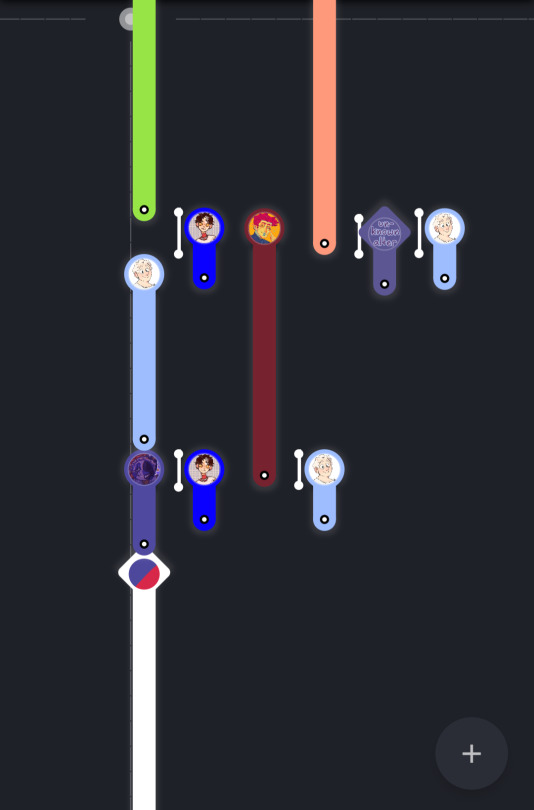
or "day fourteen of The Silence. the radios have long since stopped working, and i write these entries to keep myself and the slow, steady, dripping of the water company. i have officially been without human contact for weeks, and i fear the decay of my very soul"

#tbh i have no idea if we're good at being co-con or not#cause we can do it#but not often enough to really be useful#and being frontstuck to some degree feels like its our norm#chris.txt#system stuff#alters#did memes#osdd#osdd memes#plural system#system memes#system things#simply plural#switching#front stuck
1K notes
·
View notes
Note
why are systems the only ones who run emoji blogs /j
can i request a "switching" emoji?
-[REDACTED] Bailey
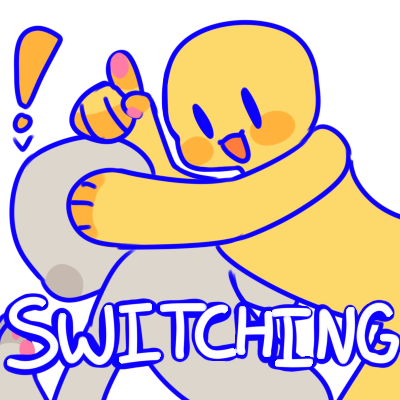
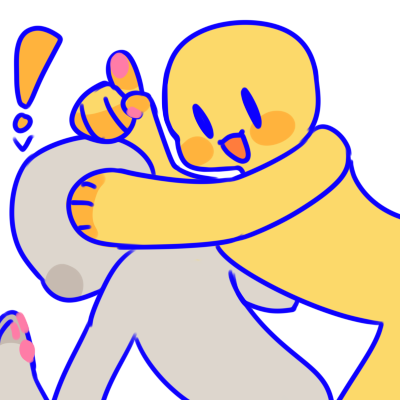
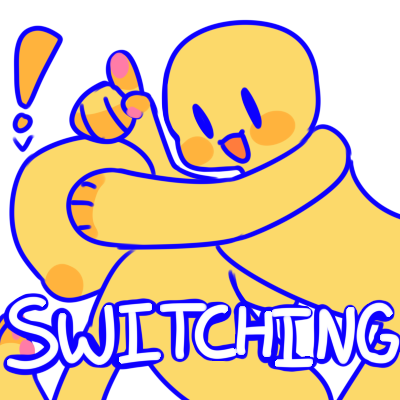

i went for more 'im shoving this idiot very nice other alter out of front and taking over' but-
anyways i hope it works!!
#switching#system#system emojis#did#osdd#emojis#custom emojis#custom emoji#emoji#discord emojis#emote#also clearly its because were all fools duh
35 notes
·
View notes
Text
Voice dysphoria is the literal worst. Like, it’s easy enough to avoid our reflection, but damn is it hard to avoid talking when most people don’t know American Sign Language.
Fuck this and me.
-Hunter
#traumagenic system#did osdd#did system#endos dni#osddid#alter#introject#did switch#hunter noceda#hunter toh
19 notes
·
View notes
Text
Alters: Who Am I?
Oftentimes with DID/OSDD, it can be difficult to tell who you are. Our system kind of has a list of questions we go through, and I thought I might post them to see if anyone else finds them useful. I’ve added some too.
Do I have an accent/speak a different language? If so, what kind?
What gender feeling do I have (masculine, feminine, androgynous)?
What pronouns do I use?
What age do I feel like (adult, middle, little)?
Am I an extrovert or introvert?
What main emotion am I feeling or goal do I have?
What music do I like?
What’s my favorite color?
How long/what style of hair do I have in innerworld?
Do I feel shorter, taller, or around the same height as the body?
Do I have any pseudomemories? If so, what are they?
Do I seem more like an ANP or EP?
Do I feel non-human in any way? If so, what do I feel about me is not human (wings, horns, etc.)?
What hand do I write with easier?
Do I need glasses?
Am I having any functioning issues (motor, vocal, etc.)?
[Insert things specific to one or a few alters in your system that others don’t experience or do.]
Please feel free to add on with other questions you might use to help yourself distinguish who you are, as this is not an exhaustive list!
#summersystemeducationweek#syseducationweek#SSEW#summer system education week#sys education week#alters#did#osdd#system#who am i#identity confusion#switching#info
930 notes
·
View notes
Text
Being a system is playing guess who every day. Like earlier today we felt like a boy, so we could eliminate the girls, and we had high empathy, so we could eliminate two of the hosts and our anger holders...
#-circus#it wasn't me for sure i just switched out#idk who we were earlier today#plural#plurality#plural system#osdd#osdd system#sysblr#monoconscious system#monoconscious
25 notes
·
View notes